Development Co-operation Directorate (DCD-DAC)
DACnews September 2012
|
|
SEPTEMBER 2012Dear reader, DACnews is designed to help development practitioners keep abreast of DAC work so that we can increase its reach and impact. We would very much appreciate your helping us to reach as wide an audience as possible by forwarding this sign-up link to people you feel may be interested. Urgent questions for development
Can we still halve the number of hungry people in the world by 2015? Do we have the right policies in place? Can we afford to pay now for the action we would need to make up for opportunities we may have lost? What is the down side of international trade and how can migration actually promote development? Can development co-operation actually do harm? These are the type of questions development practitioners and policy makers are urgently asking themselves. At the same time, they are keeping an eye on the increasingly complex challenges of juggling multiple actors, issues and demands for information that make terms like “big data”, “development-friendly” and “policy coherence” the vogue in today’s development circles. |
|
Aid for Food and Nutrition Security
Food and nutrition security (FNS) gained a high level of political attention following the 2007-08 rise in food prices that featured, for instance, on the G8 and G20 agendas. Working to improve support for food and nutrition security, the 2009 L’Aquila Food Security Initiative (AFSI) saw over USD 22 billion pledged from donors over a three-year period, of which USD 6 billion was “additional” money, over and above already planned expenditures.
Yet in 2011, food prices rose again sharply, hitting vulnerable countries hard; areas such as the Sahel and the Horn of Africa again felt the scourge of chronic hunger. Food crises like these clearly jeopardise efforts to achieve the Millennium Development Goal (MDG) of halving the proportion of people suffering from poverty and hunger by 2015. Yet financial support to agriculture has not increased apace with the growing severity and persistence of the problem, nor has it gained greater priority in donor programmes. While ODA for food and nutrition security increased to USD 11.7 billion in 2010 (up nearly 50% in real terms since 2002), its share of total ODA has only slightly fluctuated around an average of 7% of ODA. The challenge of climate 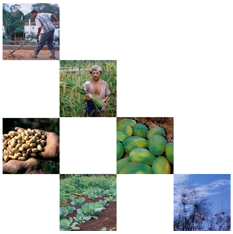 change and the demands of achieving sustainable, green growth further compound the food-related issues to be tackled by policy makers.
change and the demands of achieving sustainable, green growth further compound the food-related issues to be tackled by policy makers.
Measuring Aid to Agriculture (OECD 2010) responds to the increased international focus on food and nutrition security (FNS) by bringing together important data on the agricultural sector. There is also, however, strong interest in looking beyond agriculture to provide a more comprehensive perspective on FNS, and in examining how the L’Aquila pledge has affected donor efforts to promote FNS.
Aid for Food and Nutrition Security responds to this interest by reviewing trends and patterns in ODA for FNS. It looks at how the L’Aquila pledge is being delivered, measures the amount of donor support for agricultural research for development and identifies the main donors and recipients of ODA for FNS. It also looks specifically at how much aid for FNS goes to areas of famine and food crises, and assesses how well this aid targets hunger. The findings are surprising in some respects, disappointing in others:
-
Five countries from the Sahel region are on the list of the top 20 recipients of aid (on a per capita basis), while there are none from the Horn of Africa.
-
Most ODA for FNS is allocated to agriculture, whilst only 3% is dedicated to nutrition.
-
Despite increased international attention to hunger, there was no evident surge in ODA for FNS following the food price spikes of 2007 and 2008.
-
While individual donors may target their aid on food insecure populations and areas, the aggregate picture is that ODA for FNS is not well targeted on need.
New DAC Development Debates
 What would it take to achieve the MDGs by 2015?: While it will be challenging, it is possible to achieve the MDGs given the right mix of good policies and financial sources. This was the premise of the fourth DAC Development Debate (DDD), on 11 July, based on the study “Can we still achieve the Millennium Development Goals? From costs to policies”. Jean-Philippe Stijns, the main author of the study, estimated that the cost doing so would be about USD 120 billion. Achieving the MDGs, however, is as much about political will and policies as it is about financing. Upgrades in the quality of public policies and institutions – with a focus on development effectiveness, tax collection, public expenditure and the investment climate – are fundamental. The MDGs, are too often thought of as “Millennium Donor Goals”, overlooking domestic and other resources available for development. Instead, all flows and resources should be taken into consideration – in particular private capital, South-South co-operation, remittances, private donations and domestic tax collection – as complements to traditional aid. At the end of the day, it is about ensuring that these resources and domestic policies contribute to sustainable, inclusive growth and social development. This implies the need for a co-ordinated approach to development, environment and climate change, and to balance the complex issues of global and national goals and targets.
What would it take to achieve the MDGs by 2015?: While it will be challenging, it is possible to achieve the MDGs given the right mix of good policies and financial sources. This was the premise of the fourth DAC Development Debate (DDD), on 11 July, based on the study “Can we still achieve the Millennium Development Goals? From costs to policies”. Jean-Philippe Stijns, the main author of the study, estimated that the cost doing so would be about USD 120 billion. Achieving the MDGs, however, is as much about political will and policies as it is about financing. Upgrades in the quality of public policies and institutions – with a focus on development effectiveness, tax collection, public expenditure and the investment climate – are fundamental. The MDGs, are too often thought of as “Millennium Donor Goals”, overlooking domestic and other resources available for development. Instead, all flows and resources should be taken into consideration – in particular private capital, South-South co-operation, remittances, private donations and domestic tax collection – as complements to traditional aid. At the end of the day, it is about ensuring that these resources and domestic policies contribute to sustainable, inclusive growth and social development. This implies the need for a co-ordinated approach to development, environment and climate change, and to balance the complex issues of global and national goals and targets.
Two major challenges for post-2015 development co-operation: How “development-friendly” are non-aid policies? And are there ways of measuring “policy coherence for development” and financing for development? These were the topics on the table at the DAC Development Debate (DDD) on 4 September, based on two European Centre for Development Policy Management (ECDPM) reports. The studies argue that there is no central place for ODA in the future and that citizens around the world need more transparency about what really advances or hinders development in order to be able to put pressure on governments for global public goods. The first report proposes that to define an approach to evaluating “development-friendliness” of non-aid policies, countries must first agree on key concepts and objectives. While it is important to include emerging economies in the exercise, this involves technical challenges. An incremental, twin-track approach – starting with a DAC agreement on a set of objectives and indicators – could later become part of a global framework for development post-2015. The discussion also focused on the increasing impact of non-aid policies on development co-operation.
Likewise, non-ODA financial flows are becoming increasingly important in development, with the focus shifting towards the quality – rather than the quantity – of aid. More inclusive reporting on finance for development (FFD) will be a must in the post-2015 framework, which offers a window of opportunity to rethink reporting on FFD in order to incentivize a focus on development impact, as agreed at the High Level Forum on Aid Effectiveness in Busan.
OECD to host MOPAN Secretariat
Aid channelled to and through the multilateral development system reached USD 54 billion in 2010. MOPAN – the Multilateral Organisation Performance Assessment Network – is a network of 16 donor countries that share a common interest in assessing the organisational effectiveness of the major multilateral organisations they fund. On 17 July, the OECD Council agreed for the Development Co-operation Directorate to host the (MOPAN) Secretariat.
The network, in existence since 2002, generates 4-6 joint assessments each year and promotes information and experience sharing among its members. MOPAN’s “common approach” evaluation methodology, developed in 2009, focuses on organisational effectiveness and is built around four dimensions: strategic management, operational management, relationship management, and knowledge management. In 2012, MOPAN introduced criteria to measure an organisation’s development results as well as itsrelevance to stakeholders.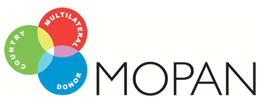
The OECD hosting arrangement reinforces synergies with the OECD-DAC’s work on evaluation, multilateral aid and aid effectiveness. This year, MOPAN assessed the World Bank (IBRD/IDA), the African Development Bank (AfDB), the United Nations Development Programe (UNDP), the United Nations Childrens Fund (UNICEF), the Joint United Nations Programme on HIV/AIDS (UNAIDS), and the GAVI Alliance; in 2013 it will assess the World Food Programme (WFP), the International Fund for Agricultural Development (IFAD), the Asian Development Bank (AsDB) and the UnitedNations Population Fund (UNFPA).
POINTS OF VIEW:
Is the data deluge a Trojan horse, or a blessing in disguise?
By Eric Bensel, Administrator in the PARIS21 Secretariat, hosted by the OECD Development Co-operation Directorate
With the emergence of citizen journalism and free, web-based news sources over the past decade and a half, print newspapers have been forced to rework their business model to adapt to new realities – or risk extinction.
National statistical systems may now be at a similar crossroads. The data that they produce enable policy makers to improve their decision making, document results, and respond to calls for accountability and transparency. But today, official statisticians face some serious com petition.
petition.
Traditionally, countries have measured societal progress using indicators such as GDP and sources such as periodic expenditure surveys and decennial population censuses. Today, users are increasingly relying on non-traditional data sources, which provide information quickly and in a form that is intuitive and often readily accessible to the average data consumer.
Buzzwords like “open data” and “big data” are increasingly seeping into public debates and are signs of this data revolution. Open data — an initiative to make government-produced data freely accessible to all users — has the potential to drive democracy and development by improving transparency, public accountability, and citizen engagement. Some 30 developing countries have signed on to the Open Government Partnership and open data portals are springing up around the developing world, notably in Kenya and Moldova.
Big data — the deluge of new forms of information deriving from crowdsourcing, social media, call logs and online transactions, to name a few — is arguably the more revolutionary of the two, as the data producers are mostly average citizens armed with a mobile device. After the 2010 earthquake in Haiti, for instance, researchers from the Karolinksa Institute and Columbia University studied mobile data to track the movements of refugees. Their work helped humanitarian agencies provide relief more efficiently, including during the subsequent cholera outbreak. Another salient example of big data in action is the Ushahidi Platform, an Africa-based online collaborative tool that crowdsources mobile and other digital information on crises.
The potential positive impact of open and big data on development processes seems obvious: improved transparency and accountability, increased civic participation, real-time, on the ground updates— the list goes on.
But are there potential negative impacts?
The potential of open and big data to fill data gaps — which will undoubtedly widen with the post–2015 development framework and its likely focus on emerging issues such as well-being, climate change, work/life balance, equity and personal security — will put pressure on official statistical systems to collaborate more broadly. Yet while the non-official actors are generating data quickly and at no charge, the quality of this data is unchecked. Official statisticians will surely reference the internationally agreed standards and question the accuracy, privacy, and relevance of data produced “unofficially”. Less sophisticated data users, however, may not care about this splitting of technical hairs, arguing: “Just give us the data.”
All of these factors will tax developing country statistical systems, which are already under-resourced and often sidelined from the policy making process. The burning issue now is how the open and big data movements can be harnessed to strengthen these systems.
New actors, new issues, and new technologies. The print newspaper industry had to respond, transforming threats into advantages. National statistical offices may soon have to do the same.
Think global, act global: Confronting global factors that influence
conflict and fragility
By Erwin Van Veen, Policy Analyst on peace and security with the OECD Development Co-operation Directorate
In the 21st century, international events, developments and processes all influence countries’ possibilities of growing, staying safe and co-operating. Long gone are the days that only foreign ministries had to deal with the world beyond national boundaries. Globalisation has brought both opportunities and threats that colour the outlook for prosperity and security. International trade, migration, transnational organised crime, liberalisation processes and even powerful ideas spread through modern technology – and they all weave their subtle influences in a web in which nations can get entangled, or prosper.
In situations of conflict and fragility, the effect is profound. The states of affairs in Guatemala, Iraq or Mali, for example, illustrate how interactions between global factors can produce negative effects. The OECD DAC’s International Network on Conflict and Fragility (INCAF) has focused on eight global factors that influence domestic conflict and fragility, analysing where and how they converge and what consequences this has for international engagement. The global factors are defined as licit/illicit processes operating at the international, regional or cross-border level (see graphic).
The INCAF analysis sheds light on opportunities and risks globalisation poses for fragile and conflict-affected states. It highlights the globalisation’s “duplicity” in enabling the growth of both licit and illicit activities. It also takes a hard look at how the risks tend to be transferred – often by OECD governments – to those countries least 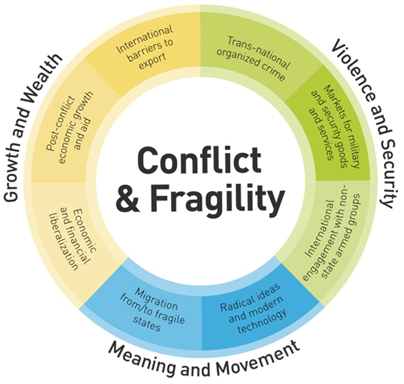 capable of dealing with them. Weaker institutions and more divided societies are just some of the spin-offs when domestic elite use and abuse global factors for political or commercial gain. From a development perspective, understanding these factors is pivotal to ensuring that international engagement has the focus and coherence required to reduce conflict, fragility and volatility.
capable of dealing with them. Weaker institutions and more divided societies are just some of the spin-offs when domestic elite use and abuse global factors for political or commercial gain. From a development perspective, understanding these factors is pivotal to ensuring that international engagement has the focus and coherence required to reduce conflict, fragility and volatility.
By taking a holistic and multidisciplinary approach that focuses on interdependencies, the project identifies five important external barriers to economic growth in fragile states. Persistent low-level violence during post-conflict periods, for instance, limits growth. This makes effective peacekeeping and management of organised crime – versus confrontation – critical. The project also analyses how modern technology can be used in under-regulated environments to spread radical ideas that can lead to violence, and points to the need for external actors to engage with networks that straddle the licit and illicit as part of a process of negotiated statebuilding.
Finally, the project offers strategic ideas for global action to confront some of these issues. This may include, for instance, by changing course in the war on drugs – from criminalization and reduction on the supply side to a public health approach and partial legalization – or piloting migration as a development strategy focused on labour as the primary asset of the poor.
The paper with the project’s key findings – and which tells this story in much more detail on the basis of rigorous analysis – has just been released for consultation, debate and reflection. You can find it here. We welcome your input.
FEATURE ARTICLE by Homi Kharas
Homi Kharas is a senior fellow and deputy director for the Global Economy and Development program of the Brookings Institution. In September 2012, he was also appointed by UN Secretary-General Ban Ki-moon to serve as lead author and Executive Secretary for the High-level Panel to advise on the global development agenda beyond 2015. Formerly a chief economist in the East Asia and Pacific Region of the World Bank, Kharas currently studies policies and trends influencing developing countries, including aid to poor countries, the emergence of a middle class, the food crisis, and global governance and the G20. His most recent co-authored books are After the Spring: Economic Transitions in the Arab World (Oxford University Press, 2012) and Catalyzing Development: A New Vision for Aid (Brookings Press, 2011). Four challenges for the Global Partnership for Effective Development Co-operationThese are important times for how the world manages the annual flow of around USD 200 billion in development co-operation assistance to developing countries. The world of global international development co-operation is changing rapidly, with development issues increasingly rising to the top of the agenda in various regional and international fora. The key issues on the table are implementation of the Millennium Development Goals, building consensus on a new set of post-2015 Sustainable Development Goals, implementing a “New Deal” on fragile states, and closer integration of environmental, security, trade, investment and development agendas. The Global Partnership for Effective Development Co-operation offers the opportunity to establish a new paradigm and governance structure for co-ordinating the many state and non-state actors engaged in development co-operation. Establishing this partnership was one of the key outcomes of the Busan High Level Forum on Aid Effectiveness held in December 2011. Busan was, first and foremost, an expression of the diversity of stakeholders involved in development co-operation. Building on the Paris High Level Forum in 2005 (which adopted and enshrined the principle of country ownership) and Accra in 2008 (where the role of civil society organizations was formally acknowledged), the tent was further broadened at Busan. Forum participants stressed the importance of emerging economy donors, the private business sector and parliamentarians; international and local civil society organizations (CSOs) were mainstreamed into the debates; and developing countries actually led many side-events. Busan was also about the need to move away from one-size-fits-all answers to development co-operation. Different country contexts require differentiated solutions. This was most apparent in the discussions on fragile states, where traditional approaches to development co-operation have failed. The New Deal on engagement in fragile states was unveiled at Busan and enthusiastically endorsed by participants in the International Dialogue on Peacebuilding and Statebuilding. Yet perhaps the most remarkable feature of Busan was the self-critical appraisal of the functioning of the Working Party on Aid Effectiveness, the DAC-supported international partnership for aid effectiveness that promoted the High Level Forum in Busan as well as the meetings that led up to it. In doing so, the DAC recognized that a different governance structure would be needed to support broader partnership and reflect the multi-stakeholder nature of development today. On 28-29 June 2012, the Working Party on Aid Effectiveness met in Paris to bring into being the new Global Partnership for Effective Development Co-operation and with this, the Working Party dissolved itself. This constitutes one of the first times that a multilateral structure voluntarily disbanded itself to be replaced by a more suitable mechanism. Thanks to a transparent process of meetings and dialogue, there is much to be encouraged about with the Global Partnership, but as with most efforts for institutional change, the devil is in the details. The first of the challenges for the new partnership – the design of a governance structure that reflects the broad nature of new actors in development co-operation – has been largely accomplished with the proposed composition of the Steering Committee of the Global Partnership. Its three co-chairs are representatives from donor, recipient and emerging economy countries while other members of the Steering Committee include, for example, representatives from five other recipient countries (including one from fragile and conflict-affected states), the private sector, parliamentarians, civil society and multilateral development banks. The second major challenge will be to ensure a more inclusive role for emerging economy donors and to integrate the differing nature, modalities and responsibilities of South-South co-operation into the global framework. Emerging economy donors will have two representatives (including one co-chair) on the Steering Committee, but countries engaged in South-South co-operation are not organised as a distinctive body and do not have uniform views and policies. This will make it challenging for emerging economy donors to engage effectively on the Steering Committee. The Global Partnership in general and the Steering Committee in particular should consider ways to actively include and improve upon the Building Block on South-South and Triangular Co-operation launched in Busan as a way of providing an avenue for sharing the diverse experiences among emerging economy donors. A third challenge is mainstreaming the private business sector into the development co-operation efforts, including service delivery, resources, supply chain management, jobs, etc. The Busan forum astutely provided a place for the private sector on the Steering Committee, but it is important to note that the private sector is not monolithic and its impact on development differs greatly according to the sector of engagement. Using and perhaps focusing the Building Block on Public-Private Co-operation in sectors such as agriculture and education could be a way of harnessing the disparate views and interests of the private sector to more effectively inform the discussions in the Global Partnership and the Steering Committee. Finally, a fourth – and major – challenge is the need to construct a set of manageable indicators to monitor global progress in development co-operation, while differentiating between country contexts. The indicators proposed by the Post-Busan Interim Group earlier this summer are a step in the right direction, but should also consider the important domestic interplay among recipient country governments, civil society groups and competitive businesses. This will ultimately drive accountability in development co-operation as well as sustainable and equitable economic growth. |
Update on the Global Partnership for Effective Development Co-operation
Justine Greening, the UK’s new International Development Secretary, has been named Co-Chair of the Global Partnership following Andrew Mitchell’s departure from the Department for International Development (DFID) to take up another role in the UK government. Ms. Greening joins Armida Alisjhabana, Minister of State for National Development Planning of Indonesia, and Ngozi Okonjo-Iweala, Minister of Finance of Nigeria, in heading up the Global Partnership.
“I am delighted to be taking on the role as donor Co-Chair in the Global Partnership for Effective Development Cooperation,” said Ms. Greening. “I have high ambitions for the Global Partnership and intend to work hard to make it a success. […] We have a real opportunity to enhance the way development partners work together to improve the lives of the world's poor.”
The three Co-Chairs plan to meet in Tokyo during the World Bank/IMF Annual Meetings to discuss priorities and next steps for the Global Partnership, as well as the date and venue of the first full Steering Committee meeting.
A complete list of Steering Committee members can be found at http://www.aideffectiveness.org/busanhlf4/en/about/global-partnership/748.html.
Questions concerning the Global Partnership can be sent to the joint OECD-UNDP support team care of: stacey.bradbury@oecd.org and derek.kilner@undp.org
OECD Global Forum on Agriculture: Policy Coherence for Food Security in Developing Countries
Jointly organized by the OECD’s Agriculture Committee (COAG) and the DAC, the annual Global Forum on Agriculture (GFA) will take place at the OECD Conference Centre in Paris on 26 November 2012. It will bring together policy makers in agriculture, development and food security from OECD countries, emerging economies and developing countries. They will discuss practical improvements in policy coherence at the global and country levels to help deliver food security in developing countries. The Global Forum on Agriculture is the OECD’s main instrument for dialogue among OECD members and key partner economies on issues of mutual interest in food and agriculture. It also provides the opportunity to share analytical work and policy experiences. For further information, contact Dirk Dijkerman (dirk.dijkerman@oecd.org) or Earnan O’Cleirigh (earnan.ocleirigh@oecd.org).
The New Deal: g7+ perspectives and experiences
This high-level side event on the margins of the Sixty-Seventh Session of the UN General Assembly (26 September 2012) introduced the g7+ mission and goals and explored the New Deal from the g7+ perspective and experience. Hosted by the governments of Afghanistan, Liberia and Timor-Leste on behalf of the g7+, it articulated how the New Deal supports the ideals expressed in the Millennium Declaration. It also sought to deepen understanding of the three pillars of the New Deal and explored the principles and processes that underlie this new way of engaging in conflict-affected environments. For further information, please refer to the Concept Note.
Creating a global partnership for effective development co-operation
In “Creating a global partnership for effective development co-operation”, DAC Chair J. Brian Atwood reviews the process that led to the High Level Forum in Busan and the groundbreaking agreements achieved there. Delivered at a Conference on “Creating Public Value in a Multi-Sector, Shared-Power World” (University of Minnesota’s Center for Integrative Leadership, 20-22 September 2012), the article reviews the lessons learned in creating the new Global Partnership for Effective Development Co-operation and their relevance for creating public value. “In many ways,” says Mr. Atwood, “the Busan forum was unique. It involved partner countries from the developing world, new providers of co-operation from the emerging economies, civil society and the private sector. It built on more than a decade of work done by the DAC. This could well be a model for future initiatives of its type.” Read the full article here.
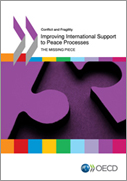 Peace processes: Why they matter and how they can succeed
Peace processes: Why they matter and how they can succeed
“Aleppo is under siege and the prospect of the loss of thousands more civilian lives in Syria is very high.” Since these words of warning from Kofi Annan, the situation in Syria has deteriorated tragically. It contrasts starkly with Yemen’s more successful transition (2012), brokered by the Gulf Co-operation Council, or the Arusha peace process that ended Burundi’s civil war (1997-2000). Sadly, however, there is one constant: violent conflict negatively impacts development. Peace processes – if conducted well – offer the promise of creating more equitable, resilient and developed societies, yet such processes are politically, socially and psychologically complex, as well as high-risk. When they fail, confidence decreases and cynicism increases, making it essential to get international support to such processes right. Improving International Support to Peace Processes: The Missing Piece is the culmination of two years of work by the OECD DAC’s International Network on Conflict and Fragility in collaboration with mediators, development and security officials, as well civil society and academia. It offers in-depth analysis and seven recommendations for improvement. It has been widely disseminated amongst permanent missions to the UN, INCAF members and civil society to enrich and influence the ongoing international debate. For further information, contact Erwin van Veen (erwin.vanveen@oecd.org).
Canada’s development aid: Focused and effective, but should be more generous and efficient
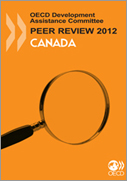 A new review of Canada’s aid programme commends the country’s strong stand on human rights, its co-operation with developing countries and its effective efforts in Afghanistan and Haiti. The OECD’s Review of the Development Co-operation Policies and Programmes of Canada also notes that the amount of its aid is falling: from 2001 to 2010, Canada doubled its aid, but from 2010 to 2011, aid fell by just over 5% to USD 5.3 billion or 0.31% of the country’s Gross National Income (GNI). Recent federal budget cuts will further reduced this amount by 7%, or USD 389 million by 2014-15. The Review recommends that Canada increase its aid as soon as possible and work to meet the international target of 0.7% of GNI.
A new review of Canada’s aid programme commends the country’s strong stand on human rights, its co-operation with developing countries and its effective efforts in Afghanistan and Haiti. The OECD’s Review of the Development Co-operation Policies and Programmes of Canada also notes that the amount of its aid is falling: from 2001 to 2010, Canada doubled its aid, but from 2010 to 2011, aid fell by just over 5% to USD 5.3 billion or 0.31% of the country’s Gross National Income (GNI). Recent federal budget cuts will further reduced this amount by 7%, or USD 389 million by 2014-15. The Review recommends that Canada increase its aid as soon as possible and work to meet the international target of 0.7% of GNI.
The Review notes that, “Canada lacks a clear top-level statement that sets out its vision for development co-operation” and that the Canadian International Development Agency (CIDA) is modernising but needs further streamlining. In some situations – the civil-military co-operation in Afghanistan and the humanitarian efforts in Haiti – co-ordination amongst the relevant Canadian ministries, backed by the necessary funds and human resources, ensured that Canada’s development efforts were efficient and effective. Using these cases as examples, Canada should devise a whole-of-government approach to all of its development programmes.
The DAC in recent blogs and articles
“Drop in aid shows declining will for global partnership on development”, The Guardian, 20 September 2012
“Creating a global partnership for effective development co-operation”, a paper prepared by the DAC Chair J. Brian Atwood for the University of Minnesota’s Center for Integrative Leadership Conference on “Creating Public Value in a Multi-Sector, Shared-Power World”, 20-22 September 2012.
“Child mortality: aid works”, OECD Insights, 19 September 2012
“Democracy and development”, remarks of the DAC Chair J. Brian Atwood for the Open Society Foundation and the Millennium Challenge Corporation, 17 September 2012.
“The word on women – A new development co-operation framework that works for whom?”, Trust Law blog, 7 September 2012
“Maximiser les objectifs de développement minimaux”, Jeune Afrique, 28 August 2012
“China’s foreign aid to Africa: New donors may help results”, The Washington Times, 14 August 2012
“Minerals not to die for”, OECD Observer, August 2012
“On fishing and development”, ONE blog, 6 August 2012
“Nigerian and Indonesian officials join post-Busan aid effectiveness panel”, The Guardian, 6 August 2012
“Maximizing Minimal Development Goals”, Project Syndicate, 18 July 2012 (Also appeared in French in l’Echo on 30 August 2012.)
“Aid donors must get ready for new global poverty map, says ODI report”, The Guardian, 10 July 2012
“Aid effectiveness: OECD must invite newcomers to the table”, The Guardian, 7 July 2012
Find a more complete list of blogs and articles featuring the DAC online here.
Aid effectiveness in the health sector: Progress and lessons: Comprising a growing and diverse range of actors, aid to the health sector faces complex governance and management challenges. By reviewing these challenges against the aid effectiveness principles outlined in the landmark 2005 Paris Declaration and 2008 Accra Agenda for Action, this report provides insight and lessons from the health sector that are relevant to the broader challenges of aid effectiveness.
Improving international support to peace processes: The missing piece identifies seven recommendations to improve the quality of support that states and international organisations provide to peace processes. It does this through a thorough analysis of the characteristics of today’s violent conflicts, the factors that influence the success and failure of a peace process, and the current strengths and weaknesses of international support.
|
OECD DAC countries' net ODA in 2011 |
|
USD 133.5 billion, down by -2.7 % in real terms and 0.31 % of DAC members’ combined GNI |
TOP
Vacancies
Team Leader/Senior Adviser: Governance, Statebuilding and Peacebuilding (Reference Number 08255): The DCD is seeking an experienced and dynamic leader for its governance, statebuilding and peacebuilding team. The Team Leader/Senior Adviser will work with members of the DAC and Global Partnership, and across OECD, on all aspects of governance and state-building, including in conflict-affected and fragile situations.
Statistical Analyst (Reference Number 08304): The Statistical Analyst will advance the collection, processing, analysis and publishing of data on aid and other resource flows from providers of development finance outside the membership of the DAC.

Related Documents

